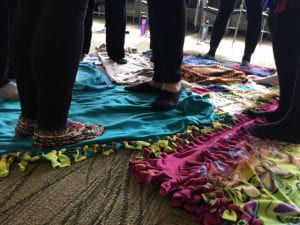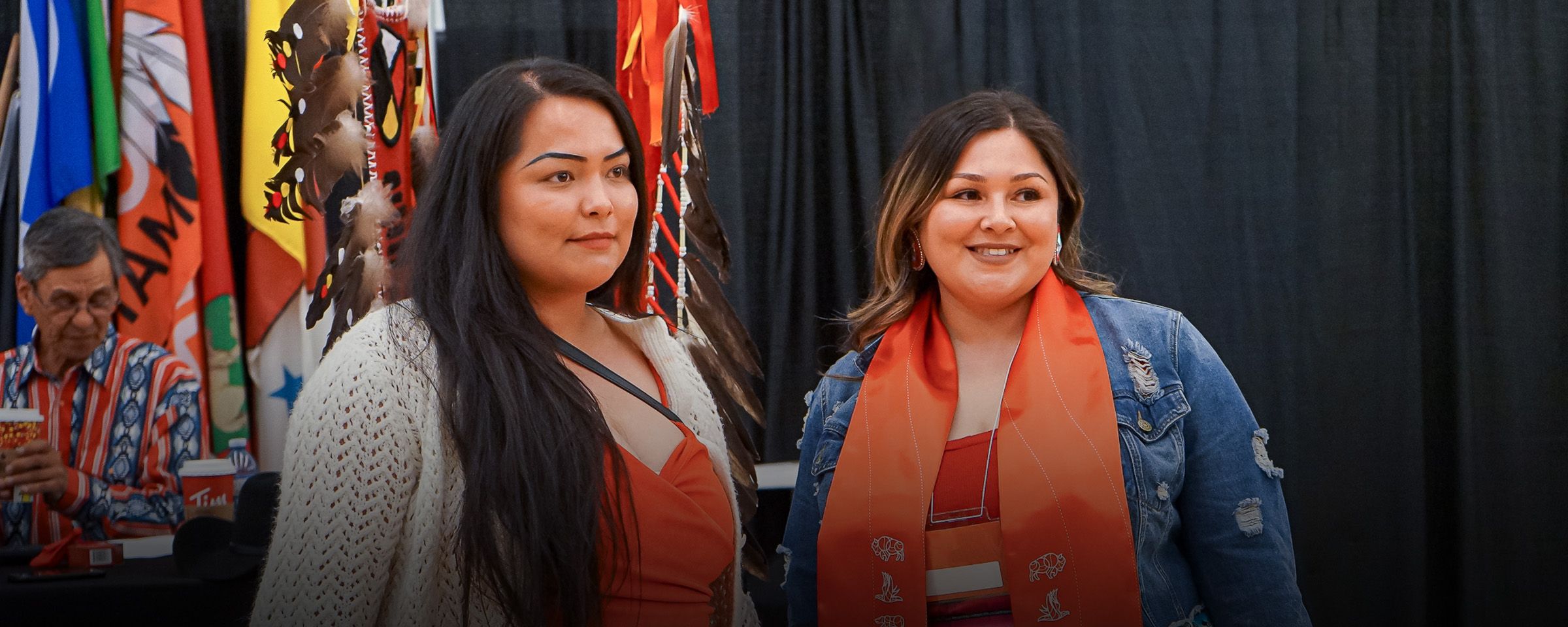How the Blanket Exercise is Supporting Reconciliation
 Red River College staff are taking advantage of a new opportunity to learn more about Canada’s history and Indigenous culture through the Blanket Exercise, which is named for the blankets participants walk on that represent North America.
Red River College staff are taking advantage of a new opportunity to learn more about Canada’s history and Indigenous culture through the Blanket Exercise, which is named for the blankets participants walk on that represent North America.
During the exercise, participants role-play as Indigenous peoples as they are guided through a simulation of the colonization of Canada. It begins with what Indigenous worldviews are and what life and governance looked like before European contact. It takes you through the first treaties, laws and policies that were enacted, the Canadian Residential School System, the Sixties Scoop, all the way up to current issues.
The exercise is designed to not only share information and key events, but in a way that is safe, supportive and non-judgmental.
Elders are an essential part of the exercise as they start the day off in a good way, share Teachings, and contribute to creating a safe environment. Every offering of the Blanket Exercise will be a little different as the College has a number of facilitators and lead Indigenous facilitators, all of who will bring their own Teachings and different life experiences to the day, which is fitting as no Indigenous community is the same.
This training is just one of the ways that the College is working to embed the Calls to Action from the Truth and Reconciliation Commission of Canada, to support the healing journey between Indigenous and non-Indigenous peoples, and to create a stronger College community.
Angela Ferris, Assistant to the Executive Director, Community & Student Services, recently experienced the Blanket Exercise for the first time and is hoping that more staff take advantage of the workshop.
“There is a need for reconciliation. As Canadians, we need to know the history of what went on because a lot of it is swept under the rug. There is that stereotype of Friendly Canada, but we have our own skeletons in the closet. As RRC employees, I think it is incredibly important because we do have many Indigenous students coming through our doors. It’s important that we can understand their history and where they might be coming from.”
Growing up in Eastern Canada, Ferris didn’t encounter Indigenous people or relations except for when protests were on the news, which were difficult to understand. “It was never talked about. It wasn’t until I moved to Winnipeg that I was exposed to Indigenous people because I just never met any Indigenous people, or if I did, they didn’t identify as being indigenous so I didn’t know. Then I saw the relations and the tensions and it was shocking, but I didn’t really know what to do.”
Ferris was looking for ways she could educate herself, and fortunately when she attended the University of Winnipeg for her Bachelor of Education Degree, Indigenous studies was part of her education.
“It kind of just fell into place, and luckily it did. I remember thinking now that I’ve learned the history, I feel like I can be an ally and talk to other people about it and make them question their own view.”
As a non-Indigenous person, Ferris thinks this is the most important thing allies can do – question their own views and ask others to do the same.
“It’s so easy to grow up thinking one way, or have other people’s views internalized without even taking the time to question it. I would like more people to question what they thought they knew. Everyone has their own beliefs, right or wrong, but I think it’s good to always question it and never think that you are 100% correct. If more people could just question, I think that would be great.”
Although she had formal education on Indigenous history, she felt the Blanket Exercise made it feel much more real. “I could definitely visualize that feeling, that grief, that moment, a lot better than just reading it on paper.”
She said the whole day was very powerful and incredibly informative, but the moment that stuck out the most was the sharing circle where she felt everyone was very open to speaking and listening to one another. It was a great way to end the day. She also thinks that having the workshop in the Indigenous Support Centre provided a good energy and is a place everyone at RRC should experience. “You walk in and everyone is so welcoming.”
Although the day was emotional, she felt supported all the way through. “I felt I could have gone to any facilitator and they would have been there for me.”
“You can always learn something new and I think it’s worth taking the time because we are Canadians. It’s incredibly important and it’s worth making a priority.”
Find more information here.
